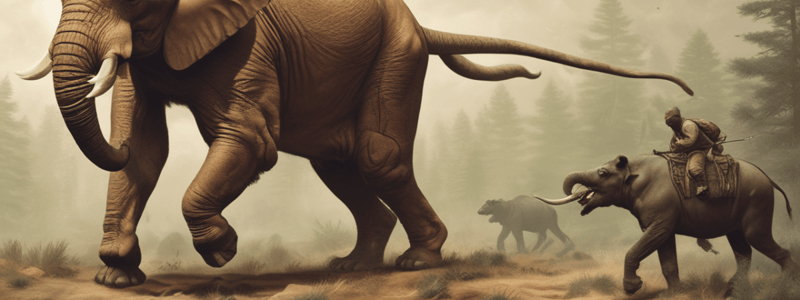Podcast
Questions and Answers
True or false:Animals only engage in territorial battles to attract mates.
True or false:Animals only engage in territorial battles to attract mates.
False (B)
True or false: Ants engage in turf wars by raiding other colonies for food and supplies.
True or false: Ants engage in turf wars by raiding other colonies for food and supplies.
True (A)
True or false: Territory can give access to the best food and attract mates.
True or false: Territory can give access to the best food and attract mates.
True (A)
True or false: Wildebeest establish long-term territories during their migration.
True or false: Wildebeest establish long-term territories during their migration.
True or false: Victory in a turf war is not important for survival and expansion of one's realm.
True or false: Victory in a turf war is not important for survival and expansion of one's realm.
True or false: Turf wars only happen in areas with visible turf or territory.
True or false: Turf wars only happen in areas with visible turf or territory.
True or false: Different animal species never engage in territorial battles.
True or false: Different animal species never engage in territorial battles.
True or false: Gorillas have overlapping territories and females can move between troops to mate.
True or false: Gorillas have overlapping territories and females can move between troops to mate.
True or false: Territorial battles can turn violent, with animals using their physical strength and weapons such as horns, claws, and tusks.
True or false: Territorial battles can turn violent, with animals using their physical strength and weapons such as horns, claws, and tusks.
True or false: The winners of territorial battles may be injured or forced to leave the area, reducing their chances of survival and reproduction.
True or false: The winners of territorial battles may be injured or forced to leave the area, reducing their chances of survival and reproduction.
True or false: Human development and resource exploitation are not affecting the natural habitats of animals, reducing territorial conflicts.
True or false: Human development and resource exploitation are not affecting the natural habitats of animals, reducing territorial conflicts.
True or false: Observing and studying territorial battles cannot provide insights into animal behavior and evolution.
True or false: Observing and studying territorial battles cannot provide insights into animal behavior and evolution.
Flashcards are hidden until you start studying
Study Notes
- Animals stake their claim to territory and fight to defend it or expand it.
- Leopards are solitary and mark their territory with urine, feces, and scent glands.
- Lions run their realm like a family business, with a pride of females and cubs led by one or two males.
- Ants engage in turf wars, raiding other colonies for food and supplies.
- The Malagasy paradise flycatcher battles bullies to keep his home in a forest full of birds and primates.
- Territory can convey physical strength, give access to the best food, and attract mates.
- Wildebeest establish short-term territories during their migration.
- Animals use a variety of tactics to defend their territory, including fighting, marking with scent, and swarming as a group.
- Victory in a turf war can mean survival and expansion of one's realm.
- Turf wars can happen anywhere, even in areas without visible turf or territory.
- Different animal species engage in territorial battles to secure resources and mating opportunities.
- Wildebeests use headbutting to establish their territory, while brown bears compete for fishing spots during the salmon run.
- Gorillas have overlapping territories and females can move between troops to mate, while hippos fiercely defend their water territory.
- Male northern elephant seals compete for the best territories to attract females during breeding season.
- Territorial battles can turn violent, with animals using their physical strength and weapons such as horns, claws, and tusks.
- The winners of territorial battles gain access to resources and mating opportunities, increasing their chances of survival and passing on their genes.
- The losers may be injured or forced to leave the area, reducing their chances of survival and reproduction.
- Human development and resource exploitation are shrinking the natural habitats of these animals, intensifying territorial conflicts.
- These conflicts play an important role in maintaining the overall health and balance of animal populations.
- Observing and studying these territorial battles can provide insights into animal behavior and evolution.
- winter turns to spring bulls cows and their pups leave the beach for the open ocean but not before enjoying a well-earned rest you
Studying That Suits You
Use AI to generate personalized quizzes and flashcards to suit your learning preferences.





